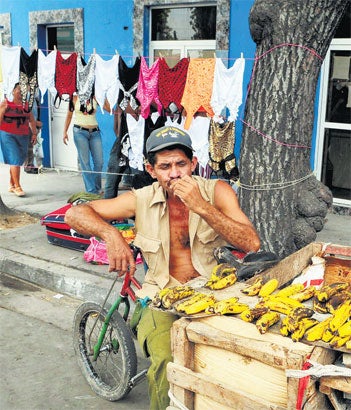The Independent's journalism is supported by our readers. When you purchase through links on our site, we may earn commission.
The Island That Dared: Journeys in Cuba, By Dervla Murphy

The foreign image of Cuba remains heavily dominated by male fantasies involving paradise beaches, uninhibited dancing and the proverbially stunning mulatta.
A refreshingly different book on Cuba is thus likely to be written by a woman in her mid-seventies who hates beach holidays, has no especial interest in salsa, and makes her first trip to the island accompanied both by her daughter and three young grand-daughters. Dervla Murphy is a truly individualistic traveller; and her family is no ordinary one. Her daughter Rachel is someone whom her readers have known since the age of five, when she was carried on the back of a bicycle all the way to India. And Rachel's three daughters, the delightful Trio, are clearly being given a similar education in hardiness and adventure.
The opening section is devoted to an ad hoc family trip which even shocks some Cubans in its casual approach to the problems of travelling in this country, let alone with children. The Trio themselves, like their mother, are fortunately enhanced by their experiences, and contribute to the sense of wonder their grandmother feels on encountering such magical places as the wild coastal landscape near Baracoa. Nonetheless, when Dervla decides to return to Cuba to pursue her complex love affair with the island, she acknowledges that without the Trio she "wouldn't have to worry about food supplies, landmines, staying too long in museums, travelling by train, getting lost, being arrested. As a traveller, I'd be back to normal."
Her two long return trips expose the difficulties of an independent traveller in a country where going off the beaten tourist track is discouraged, bureaucracy is horrendous, transport mainly a question of luck, and a late-night visit to a train's toilet leads to a near fatality as Murphy opens a door to find a gaping hole behind. She creates further hardships by what seems at times an almost masochistic desire to walk through parts of the island where few hikers have been mad enough to go.
The Island that Dared is a long, massively researched and endlessly discursive book held together by Murphy's energy, passion and humanity. She shows curiosity in countless aspects of Cuba (with the notable exception of its many outstanding writers, above all the late and still officially ignored G Cabrera Infante). But her great fascination is with the politics and everyday lives of Cuba's people. In one of the numerous asides, she makes it clear that she is not one of those travel writers who go in for poetic or boastful embellishment of the truth, but is more concerned instead with revealing life at a particular moment. Thanks to her trusting acceptance of everyone she meets on her journeys, and a determination outstripping her rudimentary Spanish to try and understand their lives, she has produced a portrait of Cuba in the late Castro period more intimate and detailed than ever before.
Moreover, few other writers have been quite so sympathetic in their defence of Castroism, due in part to a mixture of intelligently conveyed common sense and unfailing honesty. She is able one moment to pick holes in the arguments of those who have accused Castro of abusing human rights, while admitting that, had she been born in Cuba, she would probably not "have had the courage of my socialist convictions... at the cost of my freedom to write and travel".
At the heart of her deep respect for Castro's regime is a romantic self-identification with a country that has defied the rest of the world for so long, and whose material limitations have encouraged ingenuity, altruism and an ecological outlook on life. She, as a self-confessed technophobe incapable of understanding the purpose of such commodities as hair-dryers, accepts that were she "a species rather than an individual I'd be doomed to extinction". But she continues to be optimistic that Cuba, post-Fidel, will not go the way of Miami and give in to "Capitalism Rampant". Sadly, you suspect that it will need the Trio to return one day to Cuba and produce there generations of like-minded Murphys to ensure that their grandmother's vision is a reality.
Michael Jacobs's latest book is 'Ghost train Through the Andes' (John Murray)
Subscribe to Independent Premium to bookmark this article
Want to bookmark your favourite articles and stories to read or reference later? Start your Independent Premium subscription today.

Join our commenting forum
Join thought-provoking conversations, follow other Independent readers and see their replies